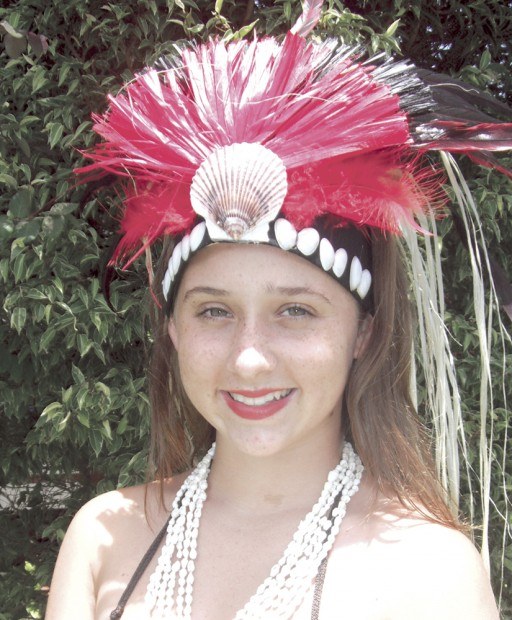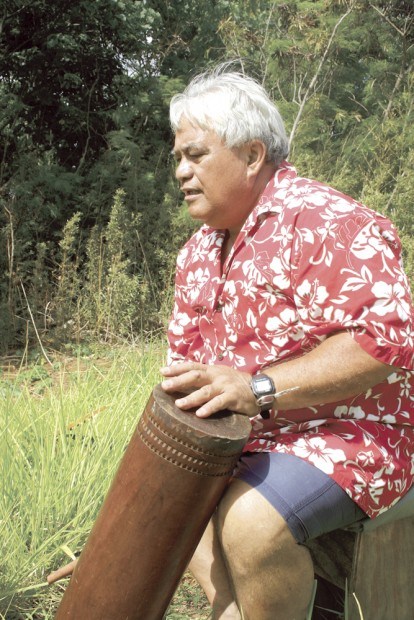Teresa Huff loves Tahitian dance. The 16-year-old Kapa‘a High School student did not win last year in the annual Heiva I Kaua‘i Tahitian dancing and drumming competition, but she hopes this year will be a different story. Slated for Saturday
Teresa Huff loves Tahitian dance. The 16-year-old Kapa‘a High School student did not win last year in the annual Heiva I Kaua‘i Tahitian dancing and drumming competition, but she hopes this year will be a different story.
Slated for Saturday and Sunday, Aug. 6-7, at Kapa‘a Beach Park, the tenth annual Heiva I Kaua‘i attracts youthful dancers and drummers from all the Hawaiian islands as well as from the mainland and across the Pacific. The dance competition features solo and group performances.
Teresa will compete as a solo performer and as part of a dance group, Rava Tikiti Nui, which she organized.
“I’ve been dancing since age six,” she said, noting that her father, Mark Huff, is a musician. “I guess because I grew up dancing, after the Heiva last year, Pairu came up to me and asked me if I could teach in his new halau [school].”
Tepairu Manea is the guiding force behind Heiva I Kauai Iaorana Tahiti, which has become a major multi-cultural event on the island. A Tahitian and Cook Islander, Manea reclaimed his heritage late in life to become a master drum maker specializing in Polynesian instruments.
Teresa Huff said that she initially felt “overwhelmed” by Manea’s offer to be his only teacher, but she rose to the challenge.
“I started learning how to do the basic drumming, so I could adapt my dancing to the drumbeat when teaching,” she said.
“I never knew drumming was so complicated. Now when I listen to the drumming from backstage, I can really see all the work that goes into it.”
With a the basics of drumming as a foundation, Teresa said, “I got some friends together and taught them to dance, just to see if we could go somewhere. We kept adding people, and that’s how the dance group was formed.”
At present, Rava Tikiti Nui has ten members, aged six to 17, “but not all of them are comfortable performing in shows,” she explained. “Some of them just like to practice and learn.”
The name of the group was carefully chosen. “Rava means ‘mixed’ in Tahitian,” she said, “and that’s because he have Tahitian, haole, Filipino, and local members. Tikiti is the style of Tahitian drumming with a rapid beat. Nui means full-hearted and all together. So we are Rava Tikiti Nui.”
The first dancer that Teresa recruited was her good friend Lexi Stogner, age 15, entering the 10th grade this year at Kaua‘i High School.
Lexi recalled how it all began. “After Pairu offered her a job to be his only kumu [teacher], she taught me the basics last October. I really enjoyed it and stuck with it.”
Today Lexi has a key leadership role in the group. “Teresa creates most of the choreography,” she said, “and after she teaches it to me, I help the other students learn it. Sometimes I help with the choreography by giving suggestions here and there.”
As both a student and a teacher in the Rava Tikiti Nui halau, Lexi said she’s hoping to see the group get more jobs. “We’ve been paid for some shows,” Lexi said, “and most of it goes for costumes. I hope we get more paid jobs in the future, so I can put away money for college. I want to be a doctor.”
Lexi said her parents, John and Tracy Stogner of Princeville, fully support her dancing. “It’s really cool the way they enjoy coming to shows, and they like how I’ve grown because of it.”
Although she was “kind of shy at first,” Lexi said, “I’ve become a lot more outgoing. Performing has helped me become more confident. I can actually do something that I never thought I could do, to get up and dance in front of a lot of people.”
Lexi competed for the first time at the Polynesian Festival this year. “I did it just for fun and for the experience,” she said. Does she hope to win as a solo performer at the 2011 Heiva? “Maybe if I practice hard enough,” she said, adding that she will enter as a solo performer and as a member of the group.
Teresa also plans to compete as a solo performer and as a group member. “I didn’t place at the Heiva last year,” she said, “but this year I’ve had a lot more practice, and I’ve worked on my stamina. I have to adapt to whatever the musicians do in the moment, so I hope I’ve done enough to get ready. We’ll just see what happens.”
Like here friend, Teresa hopes to earn income for college from Tahitian dancing. After high school, she plans to enter culinary school.
“I’m doing something I love with my friends,” Teresa said, “and that makes me really happy.”
Teresa said her source of inspiration is Tepairu Manea. “He’s always telling us, ‘Follow your heart, and you will get there.’ That helps me through the hard times, like when I get stressed about a show or competition. He’s taught me to take on only one thing at a time, so I don’t give up when it’s hard.”
Another benefit has been the increased respect in the community, she said. “I have a lot of people who come up to me and say, ‘I didn’t know you teach dance.’ They seem more interested in me than they did before, or at least I’m noticing it more.”
Teresa said that what excites her most is “making the culture stronger. I always try to tell people the meaning and the story behind a song before we dance, like saying this is a love song for a person or a place, and that way people can picture this as the dancer moves.”
In a real way, Teresa Huff embodies what Tepairu Manea sees as his life mission— preserving and promoting Tahitian culture in the larger society.
“In the past,” Manea said, “it’s not been very easy for someone to cross from one halau to another.” A person who wanted to learn a new way of drumming or dancing had to ask permission from the teacher, which hindered learning.
“I think everybody should have the freedom to learn without anyone stopping them,” he said.
Manea offers the example of Jesse Maopi, the lead drummer for the Luau Kalamaku at the Kilohana Plantation. “He is a master drummer of Polynesian heritage who knows the drumming of New Zealand, Cook Islands and Tahiti. I was able to bring him on board as a teacher because I want everyone to learn from him.”
Said Manea, “The whole idea is to build on the halau and its traditions to go in the next direction. My dream is to educate the youth to live in a good way before they go away to college, maybe help them earn some pocket money, or even create a career that puts food on the table working for the hotels or a big entertainment company like Tahiti Productions, which employs 50,000 people around the world.”
The youth who study with him gain many benefits, he said. “Learning is a lot better than getting into drugs, and a good dancer or drummer is like an athlete who has to be healthy. Drumming and dancing is not easy.”
Manea said he is committed to the multicultural aspects of an open halau. “To me every culture is beautiful,” he said. “Teresa and Lexi prove you don’t have to be a Tahitian to be good at Tahitian dancing. We have the freedom to learn anything we want to learn in this country.
Manea’s goals are simple. “I want to help people understand themselves more and help them make their lives much better,” he said. “That’s the spiritual part. If you have self respect and you respect our culture, you will be okay, eh?”
Saturday-Sunday, Aug. 6-7
Kapa‘a Beach Park, Kaua‘i
Admission; $5 per day
Information: 823-8464




